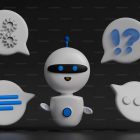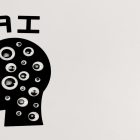Artificial Intelligence: Exploring the Future

Artificial intelligence (AI) is an innovative and transformative technology that has revolutionized many industries. It is the development of computer systems that can perform tasks that would normally require human intelligence, such as visual perception, speech recognition, decision-making, and language translation. The future of AI is exciting, and the potential applications are limitless. In this article, we will explore the current state of AI, its potential impact on society, and what the future holds for this incredible technology.
1. Introduction
Artificial intelligence has come a long way since its inception in the 1950s. Today, AI systems are capable of performing complex tasks that were once thought to be impossible. The advancements in machine learning, natural language processing, and robotics have paved the way for a future where AI will become an essential part of our daily lives.
2. Brief History of Artificial Intelligence
The idea of creating machines that can think and reason like humans has been around since the ancient Greeks. However, the modern field of AI was born in the 1950s when computer scientists began to explore the possibility of creating machines that could perform tasks that were traditionally reserved for humans.
In the 1960s, the first AI programs were created, and by the 1980s, AI had become a hot topic in the technology world. However, progress was slow, and it wasn’t until the development of machine learning algorithms in the 1990s that AI really started to take off.
3. How AI Works
AI systems work by processing large amounts of data and using algorithms to analyze and identify patterns. These patterns are then used to make predictions or decisions. Machine learning is a type of AI that allows systems to learn and improve without being explicitly programmed to do so.
4. Types of AI
There are four types of AI systems: reactive machines, limited memory, theory of mind, and self-aware AI.
Reactive Machines
Reactive machines are the simplest type of AI system. They can only react to the current situation and do not have the ability to store or use past experiences.
Limited Memory
Limited memory systems are capable of learning from past experiences and using that knowledge to make better decisions in the future.
Theory of Mind
Theory of mind AI systems have the ability to understand the emotions and beliefs of other people.
Self-aware AI
Self-aware AI is the most advanced type of AI. These systems have a sense of self and can understand their own emotions and beliefs.
5. Current Applications of AI
AI is currently being used in a variety of industries, including healthcare, finance, transportation, and manufacturing. Some examples of current AI applications include:
- Autonomous vehicles
- Predictive maintenance in manufacturing
- Fraud detection in banking
- Speech recognition in virtual assistants
- Medical image analysis
6. Potential Impact of AI on Society
While the potential benefits of AI are significant, there are also concerns about the impact it could have on society.
Employment
One of the biggest concerns is that AI could lead to widespread job loss, particularly in industries such as transportation and manufacturing.
Privacy and Security
Another concern is that AI systems could be vulnerable to cyberattacks, potentially leading to data breaches and other security issues.
Ethics
There are also ethical concerns surrounding the use of AI. For example, there are concerns about the potential for bias in AI systems, as well as the potential for AI to be used for nefarious purposes.
7. Future Developments in AI
Despite these concerns, the potential for AI to transform our world is immense. Here are a few of the most exciting developments to watch for in the coming years:
Advancements in Machine Learning
Machine learning is the key to unlocking many of the potential applications of AI. As machine learning algorithms become more sophisticated, we can expect to see AI systems that are better able to understand and interact with the world around them.
Robotics
Robotics is another area where we can expect to see significant advancements in the coming years. As robots become more sophisticated, they will be able to perform a wider range of tasks, from manufacturing to healthcare.
Natural Language Processing
Natural language processing is the area of AI that focuses on understanding and processing human language. As this technology continues to improve, we can expect to see more advanced virtual assistants and chatbots that are able to communicate with humans in a more natural and intuitive way.
8. Challenges Facing AI Development
While the potential for AI is immense, there are also significant challenges facing its development. Some of the key challenges include:
- Lack of data
- Difficulty in explaining AI decisions
- Concerns around bias and fairness
- Legal and regulatory challenges
9. Conclusion
Artificial intelligence has the potential to transform our world in ways that we can’t even imagine. From healthcare to finance to transportation, AI is already making a significant impact in many industries. While there are certainly challenges facing its development, the potential benefits are too great to ignore. As we look to the future, it’s clear that AI will continue to play an increasingly important role in our lives.
10. FAQs
What is artificial intelligence?
Artificial intelligence is the development of computer systems that can perform tasks that would normally require human intelligence, such as visual perception, speech recognition, decision-making, and language translation.
What are the different types of AI?
There are four types of AI: reactive machines, limited memory, theory of mind, and self-aware AI.
What are some current applications of AI?
AI is currently being used in industries such as healthcare, finance, transportation, and manufacturing. Some examples of current AI applications include autonomous vehicles, predictive maintenance in manufacturing, and speech recognition in virtual assistants.
What are some potential challenges facing AI development?
Some of the key challenges facing AI development include a lack of data, difficulty in explaining AI decisions, concerns around bias and fairness, and legal and regulatory challenges.
What is the future of AI?
The future of AI is bright, with advancements in machine learning, robotics, and natural language processing paving the way for new applications and opportunities. However, there are also concerns around the potential impact of AI on employment, privacy and security, and ethics that must be addressed.





































